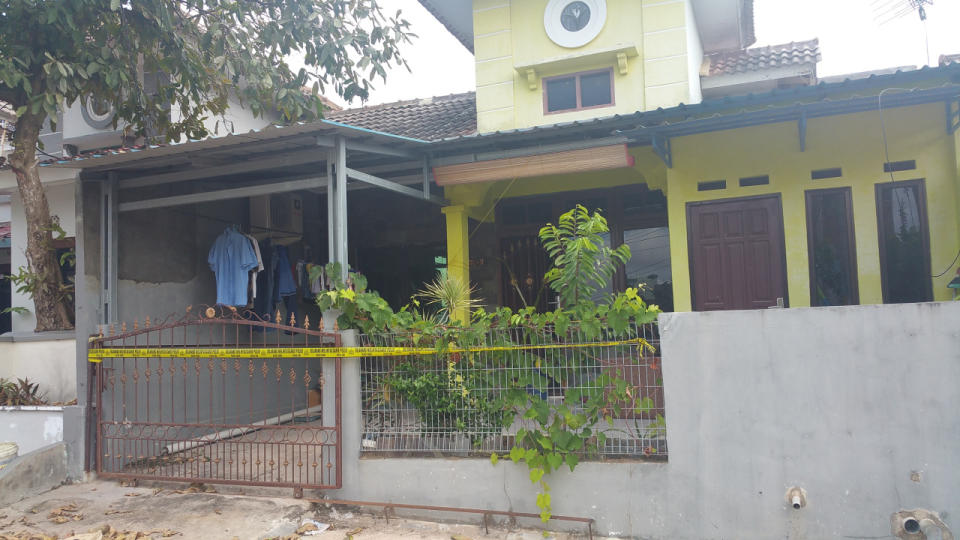Singapore’s Malay-Muslims support counter-terrorism efforts, say threat is “real”

The house of Gigih Rahmat Dewa in Batam, the suspected leader of KGR@Katibah GR, which was cordoned off. The group was suspected to have plotted to launch a rocket attack on Marina Bay in Singapore. (Photo: Safhras Khan/Yahoo Singapore)
Several members of the Malay-Muslim community have expressed support for the Singapore government’s counter-terrorism efforts, a day after Prime Minister Lee Hsien Loong highlighted the threat of radicalisation in his National Day Rally speech on Sunday (21 August).
They said on Monday (22 August) that the community will remain vigilant to fight against plans by terrorist groups to sow discord and launch attacks against Singapore.
Lee flagged the terror threat in his speeches in Malay, Chinese and English, saying that it has both external and domestic dimensions. He cited the plot to launch a rocket attack on Marina Bay by a group of alleged terrorists in Batam, who were arrested by local authorities earlier this month
Singapore is not immune to jihadist propaganda and the government is heartened by the efforts of the Malay-Muslim community to combat radicalisation, Lee said.
Lee added that the authorities had known about plans by terrorists to attack targets in Singapore and quietly acted on the information by taking precautions, such as cancelling certain events.
Threat is real and Singapore needs to be vigilant
Member of Parliament for Bishan-Toa Payoh GRC, Saktiandi Supaat, 42, said, “It is worrying especially in the current global environment. From what Prime Minister Lee said in his rally speech, I infer the number (of terror suspects) picked up in the neighbouring countries is more.
“But I am very certain Singapore will continue to be very vigilant and efforts must be made to make sure communities remain more united in spite of the current environment.“
Dr Mustafa Izzuddin, a Fellow at the ISEAS-Yusof Ishak Institute, agreed with Saktiandi, saying that Singapore, as a global city, is not immune to external influences. These include the threat of transnational terrorism, which extends to Southeast Asia, Dr Mustafa said.
Siti Farhana Shariff, a teacher, said she was not surprised that PM Lee warned about the “real” threat of terrorism.
“It has happened, it is happening and it will happen. I am saying this because of the state the world is in right now,” she said.
As such, Siti Farhana, 25, said Singaporeans have to be fully prepared to guard against any outcome, citing the example of the Batam terror plot.
“It is no surprise that the government is planning to tighten security. But I have to say that Singaporeans, myself included, are too comfortable with the mindset that ‘Singapore is safe’ and thus take things for granted. To change that mindset will be tough,” said Siti Farhana.
But the counter-terrorism efforts should not be limited to Singaporeans and the government should also educate the foreign workers in Singapore about the threat, said editor Sofianna Ng.
Ng, 36, said she hoped that if a terror attack were to take place in Singapore, Islamophobia will not happen here, as was the case after nationalist politicians in Europe called for a ban against Muslims in the wake of the Paris terror attacks in January this year.
Political leadership and unity key in worst-case scenario
Dr Mustafa, 35, said that political leadership is of utmost importance in the event of a terrorist attack in Singapore. The government must work closely alongside the leaders of the different faiths to rally Singaporeans and help the country recover from the impact of such an attack.
“The more Singaporeans stand together and the less they react in distrust and suspicion, the quicker Singapore would recover from a terrorist attack on its shores,” said Dr Mustafa.
Saktiandi agreed, and said that Singapore’s cohesive multi-racial and multi-religious society puts it in a good stead to withstand the ripple effects of a terrorist attack.
The MP said that there is a need to show future generations how the country stands as one people in the face of such adversity.
“That is fundamental. So if an attack happens, I think our response will be and should be united and resolute,” he said.

